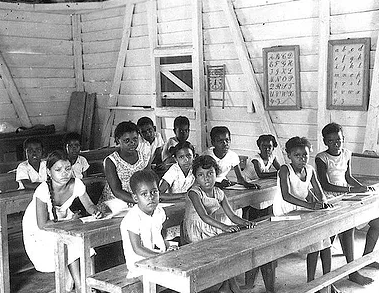
Support justice-driven, accurate and transparent news — make a quick donation to Truthout today!
The children pictured in the photograph above are from the last generation to inhabit Peros Banhos, an atoll in the Chagos Archipelago, a territory that is currently and unlawfully controlled by the United Kingdom. Today many may have passed away, but those who haven’t continue to be forced to spend their final days in exile, far from the land of their childhood memories.
Like them, thousands of Chagossians were expelled from their islands when in the late 1960s, the United Kingdom decided to grant a partial independence to Mauritius but maintain dominion over the Chagossian archipelago, engineering it as a military enclave. On its main island, Diego Garcia, the United States built one of its most secretive military bases, following an agreement with Britain worth $14 million. According to recent media reports, there are currently more than a thousand U.S. military personnel and staff deployed at the base.
The Chagossians have been struggling to recover their home for more than a half century and in 2019, it was determined that the law was on their side. The UN International Court of Justice, as well as the General Assembly of the UN, ruled that the United Kingdom must return the territory to the Chagossians within a six-month period that ended on November 22.
With the deadline looming, protests took place in London and Mauritius demanding compliance with the ruling, and 50 scholars joined the mobilization by publishing an open letter to the prime minister of Britain. The letter was also addressed to the U.S. government for its complicity in the mass expulsion.
But so far the “great powers” have shown that international law becomes wet paper when it contradicts their interests. The ongoing illegal occupation of this archipelago in the Indian Ocean is flagrant evidence that even in the 21st century, some of the most predatory dynamics of the colonial era remain in force, led by the countries most likely to boast of their commitment to the defense of human rights.
With the UN deadline officially expired, the world sadly confirms that international laws are merely symbolic. Meanwhile, the Chagossians endure yet another blow and are left to continue the struggle to once again see the land that, for now, lies only in their memories.
Press freedom is under attack
As Trump cracks down on political speech, independent media is increasingly necessary.
Truthout produces reporting you won’t see in the mainstream: journalism from the frontlines of global conflict, interviews with grassroots movement leaders, high-quality legal analysis and more.
Our work is possible thanks to reader support. Help Truthout catalyze change and social justice — make a tax-deductible monthly or one-time donation today.